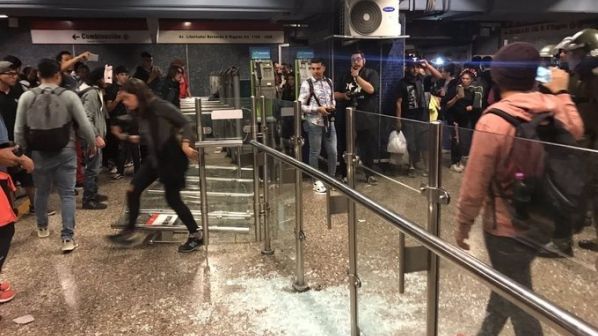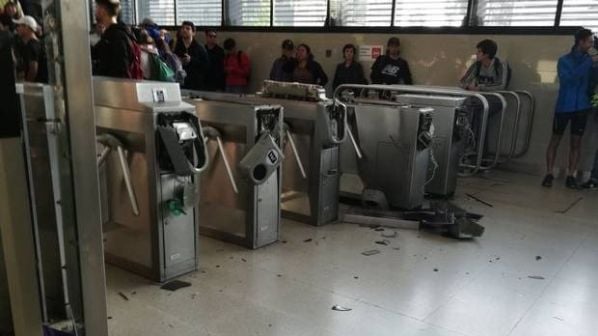The dispute began during the week starting October 14 with rising civil disobedience by passengers disgruntled by the fares hike refusing to swipe their smart cards and crawling under or climbing over turnstiles. The disobedience turned into a rebellion on October 20, resulting in many station ticket gates being destroyed, nine stations being completely burnt down, 13 partially destroyed by fire, 41 stations suffering serious damage and 17 suffering less-serious damage. In all, 80 of the metro’s 136 stations will require repair.
The worst affected stations were on lines 4 and 4A, which account for 17% of ridership. These two lines connect the new commercial heart of the city, in the municipality of Las Condes, with the heavily populated southeastern suburbs of La Florida and Puente Alto, where bus fare evasion has been rife in recent years.

During the weekend of October 19-20, the entire metro network was shut down for the first time. Line 1, the busiest on the network, partially reopened on October 21. However, the western end of Line 1 remains closed because San Pablo station together with a train was set alight. Service frequency on Line 1 was reduced from 90 seconds to three minutes and stops were omitted at five damaged stations. All other lines all remained closed on both October 21 and 22.
Santiago metro carries an average of 2.3 million passengers per day, and more on weekdays. As the rest of Santiago’s transport system is unable to cope with this volume of traffic displaced by the closure of the metro, the city took action. Schools were closed in 48 of the metropolitan region’s 52 municipalities. Since students account for 30% of public transport trips in Santiago, this alleviated much of the burden on the system. Some municipalities chartered buses and, for the first time in 30 years, shared taxi lines were authorised to enter the city centre and regular taxis were allowed to operate in shared mode. Public transport users generally took everything well and the system did not break down. However, clearly such emergency measures can only be applied in the very short term.
Increase annulled
Santiago’s public transport fares are set by a panel of experts under a law introduced in 2010. The fares are determined according to operating costs rather than on political whim. This meant Chile’s president, Mr Sebastian Piñera, had to draft a new law in order to cancel the fares increase, which was approved by Congress on October 21.
However, annulling the fares increase is unlikely to quell the social unrest, the root cause of which is low wages and income inequality.

